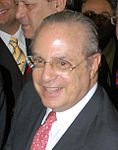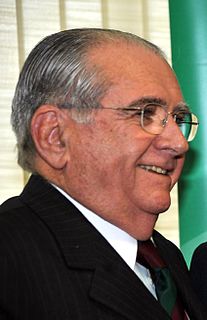| ||||||||||||||||||||||
| ||||||||||||||||||||||
| ||||||||||||||||||||||
 |
|---|
| This article is part of a series on the politics and government of Brazil |
| Foreign relations |
Presidential elections were held in Brazil on 15 January 1985, the last to be held indirectly through an electoral college, and the last to be held under the military regime. The electoral college system was put in place so that the military elite that controlled the government could secure the election of the candidate chosen by the High Command of the Armed Forces as President. However, in 1985, due to the process of negotiated transition to democracy that started in the late 1970s, the politicians in the electoral college were placed under no coercion, and were allowed to choose the president of their choice.

Brazil, officially the Federative Republic of Brazil, is the largest country in both South America and Latin America. At 8.5 million square kilometers and with over 208 million people, Brazil is the world's fifth-largest country by area and the fifth most populous. Its capital is Brasília, and its most populated city is São Paulo. The federation is composed of the union of the 26 states, the Federal District, and the 5,570 municipalities. It is the largest country to have Portuguese as an official language and the only one in the Americas; it is also one of the most multicultural and ethnically diverse nations, due to over a century of mass immigration from around the world.

An electoral college is a set of electors who are selected to elect a candidate to a particular office. Often these represent different organizations, political parties, or entities, with each organization, political party or entity represented by a particular number of electors or with votes weighted in a particular way. The system can ignore the wishes of a general membership.
Under the 1967–1969 Constitution enacted by the military, the electoral college was composed of all the members of the Brazilian bicameral National Congress (formed by Senators and Federal Deputies) and also of a number of State Deputies who were especially elected by their peers in the State Assemblies for the purpose of serving as delegates of those Assemblies in the electoral college. The 1982 legislative elections had already taken place under the process of gradual restoration of democratic freedoms, and the opposition had a slim majority of seats in the Chamber of Deputies, but the governing party, allied with the Military Regime, still controlled the Senate (only a fraction of the composition of the Senate had been up for election in 1982, other senators had been elected indirectly in the late 1970s).

The National Congress of Brazil is the legislative body of Brazil's federal government. Unlike the state Legislative Assemblies and Municipal Chambers, the Congress is bicameral, composed of the Federal Senate and the Chamber of Deputies. The Congress meets annually in Brasília, from 2 February to 27 July and from 1 August to 22 December.
Two groups were disputing the succession of President João Figueiredo: the Democratic Alliance and the Democratic Social Party. The Democratic Alliance, which advocated the restoration of democracy through the creation of a new Constitution, launched the candidacy of Tancredo Neves from the Brazilian Democratic Movement (MDB). The MDB led the Alliance and was supported by the Liberal Front Party, a dissidence of the Democratic Social Party, and the Democratic Labour Party.

João Baptista de Oliveira Figueiredo was a Brazilian military leader and politician who was the 30th President of Brazil, the last of the military regime that ruled the country following the 1964 coup d'état. He was chief of the Secret Service (SNI) during the term of his predecessor, Ernesto Geisel, who appointed him to the presidency at the end of his own mandate. He took the oath of office on March 15, 1979, serving until March 15, 1985.

The Democratic Social Party was a conservative Brazilian political party.

Tancredo de Almeida NevesSFO was a Brazilian politician, lawyer, and entrepreneur. He served as Minister of Justice and Interior Minister from 1953 to 1954, Prime Minister from 1961 to 1962, Finance Minister in 1962, and as Governor of Minas Gerais from 1983 to 1984. He was elected President of Brazil in 1985, but died before he took office.
The Democratic Social Party, on the other hand, defended the legacy of the 1964 military regime, and launched the candidature of Paulo Salim Maluf, also a civilian, but one that was aligned with the military elite that controlled the regime.

The 1964 Brazilian coup d'état was a series of events in Brazil from March 31 to April 1 that led to the overthrow of President João Goulart by members of the Brazilian Armed Forces, supported by the United States government. The following day, with the military already in control of the country, the Brazilian Congress came out in support of the coup and endorsed it by declaring vacant the office of the presidency. The coup put an end to the government of Goulart, also known as Jango, a member of the Brazilian Labour Party, who had been democratically elected Vice President in the same election in which conservative Jânio Quadros, from the National Labor Party and backed by the National Democratic Union, won the presidency.
The supporters of the regime, however, were weakened: they had even rebranded their party as the Democratic Social Party, abandoning the old name ARENA (National Renewal Alliance) in order to confuse voters at legislative elections and thus avoid a massive loss of seats. Also, in the nomination of the PDS's Presidential candidate, Colonel Mário Andreazza was the preferred candidate of outgoing President General João Figueiredo, but the membership of the PDS was no longer disciplined: former São Paulo Governor Paulo Maluf defeated Andreazza in the Party's Convention, resulting in a split in the PDS. After Maluf's nomination, many members left the Party and joined the Opposition MDB (including José Sarney, who went on to become Tancredo Neves's running mate in a political deal that secured for the Opposition the votes of the electoral college members who defected from the PDS and joined the MDB).
In 1984, the Diretas Já movement, that sought the immediate restoration of direct popular elections for the Presidency of the Republic, failed, since, in spite of strong popular support and rallies, the Opposition to the military government failed to secure the two-thirds supermajority of votes in Congress, that was required to amend the 1967 Constitution, as amended and republished in 1969.
On 15 January 1985 the Electoral College gathered to vote for the presidential election. Tancredo Neves was elected President with 480 votes (72.4%) against only 180 (27.3%) given to Maluf. There were 26 abstentions, mostly from parliamentarians from the Workers' Party, which decided to maintain its neutrality and support neither candidates. Some of its members, however, such as actress and congresswoman Bete Mendes, voted on the Democratic Alliance and ended up being expelled from the party. Overall, three members of the party (Airton Soares, Mendes and José Eudes) were expelled from it.

The Workers' Party is a democratic socialist political party in Brazil. Launched in 1980, it is one of the largest movements of Latin America. PT governed at the federal level in a coalition government with several other parties from 1 January 2003 to 31 August 2016. After the 2002 parliamentary election, PT became the largest party in the Chamber of Deputies and the largest in the Federal Senate for the first time ever. With the highest approval rating in the history of the country, President Luiz Inácio Lula da Silva is PT's most prominent member. His successor Dilma Rousseff, also a member of PT, took office on 1 January 2011.

Bete Mendes is a Brazilian actress and politician.
On 14 March 1985, just one day prior to his inauguration, President-elect Tancredo Neves fell ill with strong abdominal pain, so that he could not appear before Congress to take office as President on March 15 (the Constitution required the oath of office to be taken before a joint session of the Legislature). José Sarney, who was elected Vice-President, took office as Vice-President on inauguration day, and became Acting President at once. On 21 April 1985, Neves died from a generalized infection. Although he was never technically President because he never took the constitutional oath, he died during his Presidential term and Congress passed a special statute, directing that his name be included on the official list of Brazilian presidents as a matter of homage. Upon the death of the President-elect, Acting President Sarney succeeded to the Presidency.

José Sarney de Araújo Costa is a Brazilian politician, lawyer, and writer who served as 31st President of Brazil from April 21, 1985 to March 14, 1990. At age 88, he is the oldest living former Brazilian president, and, as of the death of João Figueiredo in 1999, the only living former president not elected by direct vote.
The Democratic Alliance's promise of passing a Constitutional Amendment to the 1967-1969 Constitution summoning elections for a National Constituent Assembly was fulfilled on 27 November 1985, with the enactment of the 26th Amendment to the Constitution inherited from the military regime era. Under that Amendment, the members of the 48th Legislature of Brazil's National Congress, that assembled on 1 February 1987 after the 1986 legislative elections, convened as a National Constituent Assembly, with unlimited powers to draft and enact Brazil's new Constitution. The Constitution was promulgated on 5 October 1988.











